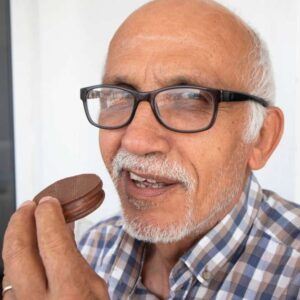
Ancient Japanese Tea Fights Cancer and Increases Brainpower
Dear Living Well Daily Reader,
“What the heck is that? A swamp latte?”
Last week, I started drinking a new morning beverage.
If you’re a longtime reader of Living Well Daily, then you probably know I’m an avid coffee drinker. But for the last few days, I’ve been reconsidering my morning ritual.
You see, since trying out this new nutrient-packed and tasty tea, I’ve been feeling focused, energized and productive, though I must say its odd appearance does make for lots of office commentary — mainly folks referring to it as a swamp latte.
However, this drink is so rich in flavor and offers so many health benefits that I will continue to drink at least one cup a day a no matter what my co-workers call it. Plus, it’s absolutely delicious!
![]() From Ancient Ceremonies to Your Cup
From Ancient Ceremonies to Your Cup
It’s called matcha.
And it’s not your typical tea.
Matcha is a special kind of tea that originates from Japan and has been served during ceremonies for thousands of years. Unlike typical teas that are made of steeped leaves, matcha is made from finely ground green tea leaves and is more like a thick latte than a watery tea.
To prepare matcha, you simply pour hot water over the powder and blend. You can do this with either a traditional bamboo whisk or an electric milk frother (I prefer the frother). Once fully blended and frothed, the tea looks like a bright-green latte and has the consistency of high-end espresso. It tastes a lot like blended green veggies with just a hint of sweetness and is very satisfying.

Creating a perfectly blended cup of Breakaway Blend 98.
But its appearance and taste, while both are interesting, aren’t what make matcha so remarkable. Instead, matcha’s incredible health benefits are what really set it apart.
![]() Curb Cancer and Boost Your Brain
Curb Cancer and Boost Your Brain
Since matcha powder is much more concentrated than regular tea leaves, its health powers are amplified. In fact, matcha has roughly 20 times the amount of naturally occurring antioxidants and amino acids of regular green tea.
Not to mention it contains huge amounts of EGCG. This flavonoid is a powerful antioxidant and can protect you from free radicals that can wreak havoc on your body and even cause cancer. EGCG has been the focus of many cancer studies that have shown it to be a powerful anti-cancer agent. Some of these studies prove that EGCG may also help protect you from certain radiations that can ignite cancer development.
But EGCG isn’t the only health-boosting compound in matcha — it’s also rich in caffeine and L-theanine. L-theanine is an amino acid that’s naturally found in matcha and can help stimulate chemicals in your brain that block stress messages, increase feelings of calm and boost your alertness and overall well-being.
When L-theanine is combined with caffeine, it can extend caffeine’s productive effects and almost erase the jittery and anxious feelings that coffee can sometimes cause. And I can testify to this nutrient combo’s amazing concentration powers.
After just a few days a drinking matcha, I’ve felt more productive, my thinking seems clearer and I’ve been able to remember details that would otherwise slip my mind. Not to mention my energy and productivity are off the charts!
I’m not saying I’m quitting coffee forever, but adding a cup of health-boosting, tasty matcha to my daily routine is a no-brainer!
One brand I really like is Breakaway Matcha. They offer both hot and cold brew matcha powders. I’ve tried both and found them to be delicious, though my favorite is their Blend 98. It’s rich, grassy and slightly sweet. This special blend comes from an exclusive matcha co-op in Ujitawara, Kyoto.
You can discover more about Breakaway Matcha and the amazing benefits of their products by clicking here.
As a Living Well Daily reader, you’re entitled to an exclusive discount of 15 percent off your entire order by entering discount code LIVINGWELLMATCHA at checkout.
Live well,

Natalie Moore
Managing editor, Living Well Daily
Ed. Note: Please send your feedback: nmoore@lfb.org – and click here to like us on Facebook
Sources
Written By Natalie Moore
Natalie Moore is a dedicated health researcher with a passion for finding healthy, natural, and science-based solutions. After a decade of direct healthcare experience in western and natural medicine, she was involved in public health research before joining Living Well Daily.
View More Free Articles
The Walking Problem Nobody Talks About (And Why It Matters)
You’ve been walking nearly your entire life. You mastered it before you could tie your shoes—and you’ve been putting one foot in front of the other for decades now without giving it a second thought. But what if I told you that the way you walk right now could be the difference between living independently...
Stop Starving Yourself—"Forbidden" Weight Loss Secret WORKS
Completely cutting out the foods you love from your diet is a recipe for disaster. You know the drill—you swear off chocolate, potato chips, or whatever your weakness is, only to find yourself face-first in a family-size bag three weeks later, wondering what went wrong. Good news—science has finally caught up with common sense. A...
Why Your Muscles Are Your Brain's Best Defense
Forget expensive brain scans and head-scratching cognitive tests that make you feel like you’re back in school. Japanese researchers have stumbled onto something that could change how we screen for memory problems—and it’s so simple, you’ll wonder why nobody thought of it sooner. A quick, painless measurement you can get during a routine checkup might...
Four Carbs that Could Add YEARS to Your Life
You’ve likely been avoiding carbs like the plague. Health gurus, fitness influencers, and diet books have convinced you that carbs are the enemy—that they spike your blood sugar, pack on pounds, and fast-track you to diabetes. So you’ve eliminated bread, sworn off pasta, and feel guilty just touching a piece of fruit. But what if...
Upgrade from Bananas and Apples to These Powerhouse Fruits
I’m often asked which fruits are the best. So, let’s talk about it. I’ll cut right to the chase: berries win this contest hands down. If you’re limiting your options to apples and bananas, you’re missing out on a universe of superior antioxidant power. Those everyday fruits are like bringing a knife to a gunfight...
The REAL Reason Americans are Getting “Fatter”
You’ve heard it a thousand times: “Americans are getting fatter because we’re lazy.” We sit at desks all day. We binge-watch Netflix instead of hitting the gym. We’ve traded physical labor for sedentary lifestyles. It’s a tidy explanation for why obesity has skyrocketed in developed countries. There’s just one problem—it’s completely wrong… A groundbreaking Duke...
Mailbag: Room Won't Stop Spinning? Do THIS First
“I’m dealing with vertigo issues, lightheadedness, and dizziness. As recently as this last Saturday I had multiple occurrences throughout the day. Is there anything I can do for this? I’m 69 and in good health. I work out 4 to 5 times a week.” —Spinning Hi Spinning, When patients approach me with similar complaints, I...
Hidden Number Secretly Sabotages Male Performance
Guys (and gals that love them), we should talk. You know how we’ve always been told that bedroom troubles are just part of getting older—that we just need to live with them? Well, it turns out that’s not true. Scientists recently wrapped up a six-year study that followed over 100 healthy men, and the findings...
Shocking Study Links Kids' Snacks to Dangerous Early Puberty
Kids are growing up in a world vastly different from the one we knew. Back in our day, if a child wanted something sweet, it was a piece of candy or a homemade cookie. Today’s kids are surrounded by products filled with artificial sweeteners that didn’t even exist when we were raising our own children....
Outdated Vitamin Guidelines Put Your Brain at Risk
If you’re like most people, you probably don’t think twice about vitamin B12—until your doctor mentions it during a routine blood test. But new research published in the Annals of Neurology suggests we need to pay closer attention to this crucial nutrient—especially as we age. Turns out, current guidelines for this essential nutrient might be...









